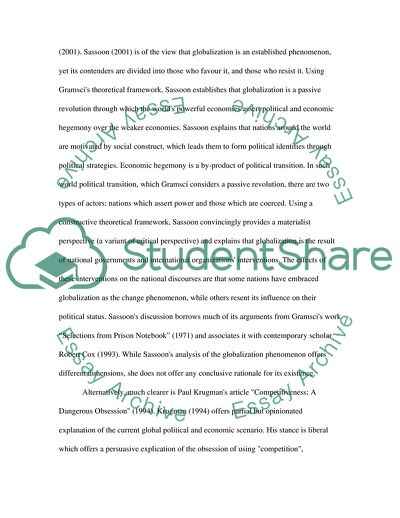
- Home
- Free Samples
- Premium Essays
- Editing Services
- Extra Tools
- Essay Writing Help
- About Us
- Studentshare
- Subjects
- Miscellaneous
- Global Political Economy
Global Political Economy - Essay Example

- Subject: Miscellaneous
- Type: Essay
- Level: Undergraduate
- Pages: 4 (1000 words)
- Downloads: 0
- Author: domingogerhold
Extract of sample "Global Political Economy"
To exemplify, the researcher shall employ, in the following section, three contemporary scholars and their articles to critically analyze how effective their perspectives are in studying the world today. One of the dominant concerns that have engaged scholars attention is the relationship of the international political economy with globalization, and its impact on the world economies. Globalization is not a new phenomenon in political economic studies. Indeed, as Strange indicates in her book "States and Markets" (1988), globalization is the study of "economic, political and social affairs.
" To interpret it, one needs to understand the politics of the world economy. This has been the idea behind Anne Showstack Sassoons article "Globalisation, Hegemony and Passive Revolution" (2001). Sassoon (2001) is of the view that globalization is an established phenomenon, yet its contenders are divided into those who favour it, and those who resist it. Using Gramscis theoretical framework, Sassoon establishes that globalization is a passive revolution through which the worlds powerful economies assert political and economic hegemony over the weaker economies.
Sassoon explains that nations around the world are motivated by social construct, which leads them to form political identities through political strategies. Economic hegemony is a by-product of political transition. In such world political transition, which Gramsci considers a passive revolution, there are two types of actors: nations which assert power and those which are coerced. Using a constructive theoretical framework, Sassoon convincingly provides a materialist perspective (a variant of critical perspective) and explains that globalization is the result of national governments and international organizations interventions.
The effects of these interventions on the national discourses are that some nations have embraced globalization as the change phenomenon, while others resent its influence on their
...Download file to see next pages Read MoreCHECK THESE SAMPLES OF Global Political Economy
Fairly Contemporary Issue about Global Political Economy
My Study in Global Political Economy
Political Science and Global Political Economy
The Global Political Economy
Global Political Economy a Marxist Critique
Global Political Economy Outline & Presentation
Issues in Global Political Economy
A Great Threat In Todays Global Political Economy

- TERMS & CONDITIONS
- PRIVACY POLICY
- COOKIES POLICY